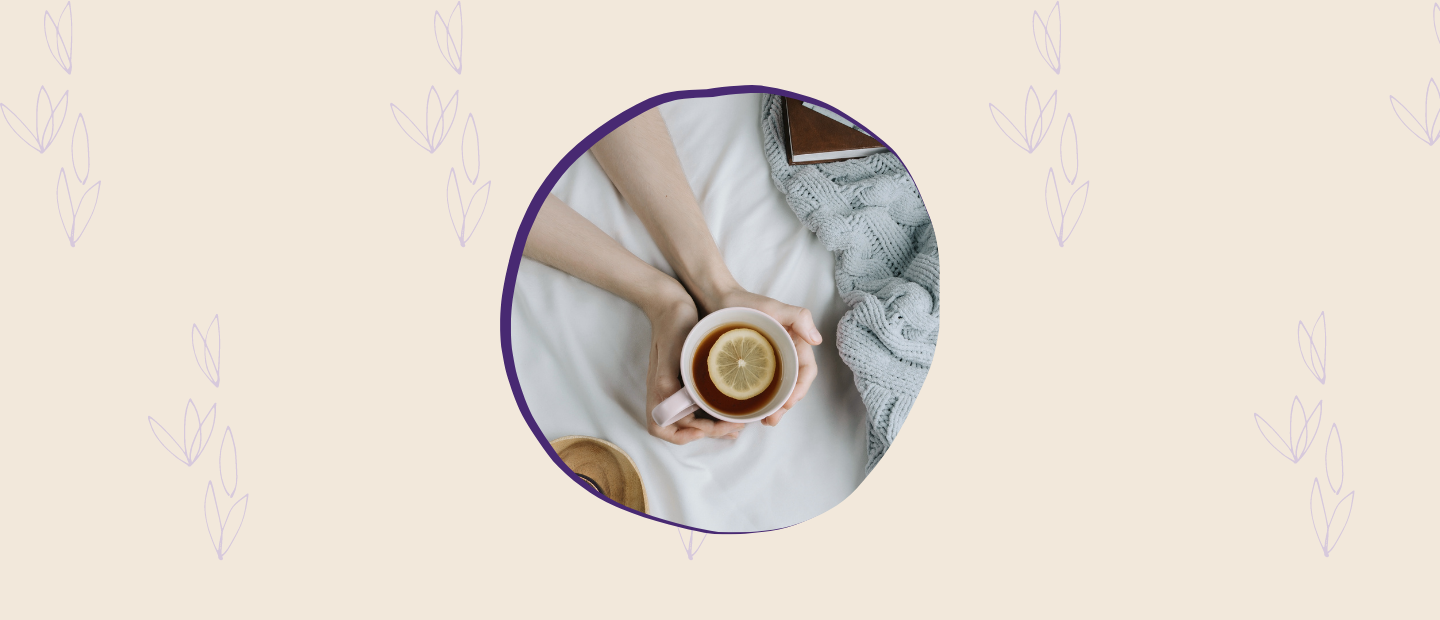There are two types of sleepers in the world: those who waltz into Dreamland 30 seconds after their heads hit a pillow, and those who need a little nudge (or two) to successfully snooze. If you find yourself in Camp Insomnia, reach for a little sleep support by way of our favourite soothing teas, designed to help calm your body and prep for rest. Paired with a proper sleep hygiene – like no screens after 9PM and a relaxing, low stakes book – teas can be just the ticket to help you nod off with ease.
1. Chamomile
Since ancient times, chamomile has been used in teas, creams, incenses, and salves to treat a wide range of ailments, from the common cold to muscle spasms to hay fever. Now, in modern day, chamomile still packs the same medicinal punch, albeit in much more commercialized packaging.
So, what’s all the fuss about chamomile, and why should you drink it? There’s a wide range of chamomile varietals, though all contain bisabolol, bisabolol oxides A and B, matricin, flavonoids like apigenin and chrysin, and other therapeutic oils. Apigenin is known to induce muscle relaxation and sedation – and, depending on the dose, works as a powerful antioxidant, anti-inflammatory, and neuroprotective substance.
All in, studies on chamomile have been shown to speed up healing, reduce muscle spasms, reduce depression, alleviate hemorrhoids, and induce sleep. Its benefits are so wide-reaching and powerful, it’s no wonder over 1 million cups of chamomile are consumed worldwide – every single day.

2. Lavender
Beloved for both its fragrance and calming effects, lavender-infused essential oils can serve as the perfect remedy to all your sleepytime struggles. But did you know lavender can also be consumed as a tea?
Native to the Mediterranean region – including Southern Europe and Northern Africa – the lavender flower houses a distinctive flavour and potent, aromatic fragrance. According to a wide range of studies, lavender tea is known to calm brain function by triggering chemical reactions in the nervous system. It also reduces the stress hormone, cortisol, and increases the percentage of deep slow-wave sleep, otherwise known as the restorative sleep phase.
If that’s not enough, lavender tea has been known to reduce inflammation, boost immune health, detoxify the body, and support overall digestive health. What’s not to love?

3. Lemon Balm
Derived from the same family as mint, lemon balm is native to Europe, North Africa, and West Asia, though it’s grown globally. Considered a jack-of-all-trades restorative substance, lemon balm tea helps to relieve stress, reduce anxiety, boost cognitive function, ease insomnia and other sleep disorders, relieve indigestion, treat nausea, minimize menstrual cramps – and even soothe cold sores.

4. Passionflower
Native to the Southeastern United States and Central and South America, passionflower is another powerhouse ingredient, treating insomnia, anxiety, high blood pressure, eczema, psoriasis, depression, menstrual discomfort, inflammatory conditions, and more.
The natural sedative effects of passionflower tea helps to balance your neurotransmitters and stimulate the release of gamma-aminobutyric acid (GABA), an inhibitory neurotransmitter that blocks certain brain signals and decreases activity in your nervous system.
In plain speak, GABA attaches to a protein in your brain and produces a calming effect. It also helps with feelings of anxiety, stress, and fear; in other words, it’s well worth dropping a few bucks for at your local grocery store.

5. Magnolia Bark
Traditionally used in Chinese medicine, magnolia bark is rich in two neolignans believed to be responsible for a wide range of medicinal benefits: magnolol and honokiol. Working as an anxiolytic, magnolia bark is designed to lower anxiety, depression, and stress. It’s no wonder the plant supplement has been used to treat conditions from inflammation to anxiety management for centuries.
Found in modern day supplements, tea, toothpaste, topical oils, and creams, magnolia bark is a therapeutic compound designed to promote sleep and relaxation, ease anxiety, treat allergies and asthma, and other conditions. It’s a GABA booster, a powerful antioxidant, an adrenaline inhibitor, and a powerful, natural sleep aid for those prone to stress and a racing mind. It even helps with weight management!

6. Valerian Root
Native to Europe and Asia, valerian root is often referred to as “nature’s Valium” given its acute ability to promote calmness and improve sleep. Common benefits of taking valerian root include being able to fall asleep faster, having better quality sleep, relief from restlessness, and no “hangover” effect in the morning, sometimes associated with taking drugstore melatonin or other sleep aids.

Struggling with insomnia? Before diving into prescription medication, consider a wide range of lifestyle habits you can hone, like regular exercise, avoiding caffeine in the afternoon (or altogether), listening to podcasts, doing yoga, winding down an hour or two before bed, no screens before slumber, making sure your mattress is in mid condition – and reaching for a cup (or two) of tea filled with ingredients to calm your mind and help you sleep.
If you liked our blog article, please don't forget to Share it with your friends by clicking the button below!










